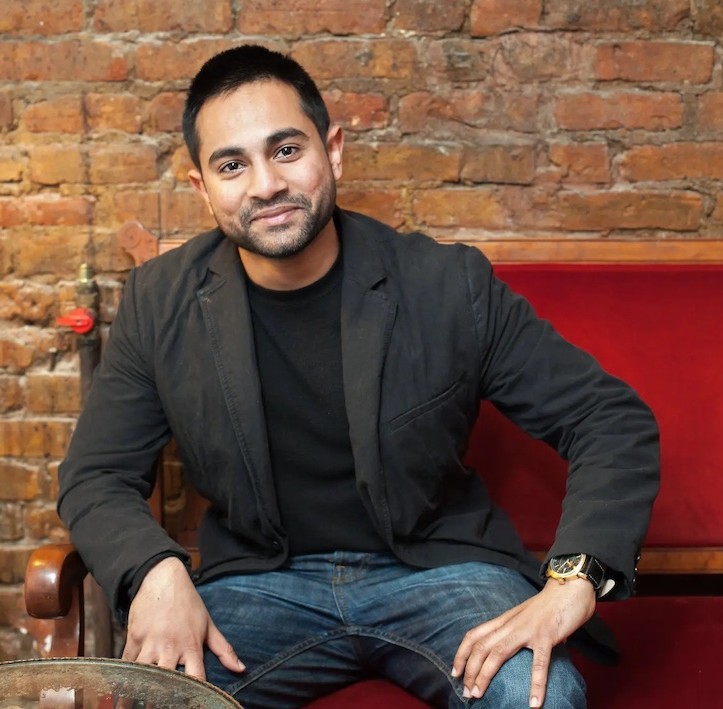Bhaskar Sunkara. Photo: Jacobin Jacobin founder Bhaskar Sunkara has been named the new president of The Nation magazine. Editorial director Katrina vanden Heuvel said of the new hire: “Bhaskar brings an entrepreneurial lens and a new generation of leadership to The Nation.” In the Spring 2019 issue of Bookforum, Frank Guan reviewed Sunkara’s book, Socialist Manifesto: The Case for Radical Politics in an Era of Extreme Inequality. Melville House is celebrating its twentieth anniversary with book giveaways, a new website, and a party planned for this September. Since it was founded by Dennis Johnson and Valerie Merians in
Sigrid Nunez Alexandra Alter surveys the recent crop of pandemic fiction for the New York Times, and talks with novelists Sarah Moss, Weike Wang, Sigrid Nunez, and more about how they decided to handle COVID-19 in their work. The critic Daniel Mendelsohn also weighed in: “You couldn’t yet have the great coronavirus novel, because we don’t know how this story ends yet.” At The Baffler, musician and writer Taylor Ho Bynum offers a literary improvisation on free jazz pioneer Cecil Taylor to celebrate the release of The Complete, Legendary, Live Return Concert. Bynum’s piece is composed of forty-four fragments,
Patricia Lockwood. Photo: © Grep Hoax For the New Yorker, Deborah Treisman interviews Patricia Lockwood (No One Is Talking About This) about her influences, humor, and “the genre of submarine books.” Lockwood also describes her process for writing book reviews: “I’ll just be there with my notebook, this giant Moleskine, writing everything down. And, I don’t know, feeling a very, very strong sense of communion with a book. I don’t think most people write that way or read that way, but I also think that most people come out of their reading with some sense of the basic plot
Branden Jacobs-Jenkins. Photo: MacArthur Foundation. The New Yorker has posted its first ever digital-only issue of interviews in what is an off week for the print magazine. The interviewees include Alexandria Ocasio Cortez, David Hockney, the late Stephen Sondheim, Patricia Lockwood, and more; the issue also includes a roundtable about sex scenes with Doreen St. Félix, Naomi Fry, Vinson Cunningham, and Alexandra Schwartz. On Thursday, February 24, the Library of America is hosting an online discussion about Octavia E. Butler’s novel Kindred with Branden Jacobs-Jenkins, who is adapting the book for TV. The LOA recently published a collection of
Markus Dohle. Photo: © Bertelsmann / Sebastian Pfütze Penguin Random House’s chief executive officer, Markus Dohle, has donated $500,000 to fight book bans. At The Cut, Allison P. Davis writes about Sean Monahan’s cultural forecasting and the idea that we’re due for a new cultural era, even if no one quite knows what it is yet: “A vibe shift is the catchy but sort of too-cool term Monahan uses for a relatively simple idea: In the culture, sometimes things change, and a once-dominant social wavelength starts to feel dated.” For the AIGA’s Eye on Design, Alana Pockros looks at why
Ottessa Moshfegh. Photo: © Jake Belcher Author Ottessa Moshfegh walked in the runway show for Maryam Nassir Zadeh at New York Fashion Week. Lauren Oyler reviewed Moshfegh’s last novel, Death in Her Hands, in the Apr/May 2020 issue. Vulture profiles Art Spiegelman, the Pulitzer winning cartoonist. The author’s masterwork, Maus, has recently been in the news after a Tennessee county school board removed the book from a middle-school curriculum after parents complained that some of the cartoon animals were nude or used profanity. The incident has since turned into a larger conversation about censorship and Holocaust rememberabce. As Spiegelman
Sheila Heti. Photo: Margaux Williamson At The Atlantic, Jennifer Senior, the author of All Joy and No Fun, has written about the end of the friendship between fiction writer Elisa Albert (After Birth) and poet and Fence editor Rebecca Wolff (The King): “It is an insolent cliché, almost, to note that our culture lacks the proper script for ending friendships. We have no rituals to observe, no paperwork to do, no boilerplate dialogue to crib from. Yet when Elisa Albert and Rebecca Wolff were in the final throes of their friendship, they managed, entirely by accident, to leave behind
Emily J. Lordi For T: The New York Times Style Magazine, Emily J. Lordi writes about the Black psychedelic movement in music, architecture, film, and art. “Like many countercultural movements,” Lordi writes, “white psychedelia looked to people of color, whose cultures seemed to form the marginalized counter to the mainstream culture, for visions of an alternative life.” Black psychedelia has also rarely been heralded as such due to critical interest in Afrofuturism, whose adherents look to “future worlds or outer space” rather than “the present, the earthly plane.” Among the questions posed by Black psychedelic art are: “What is
Sasha Fletcher. Photo: Alexandra Tanner At CNN, Leah Asmelash reports on the recent spate of closures of literary magazines, from Tin House to The Believer, and how some magazines formerly tied to universities are planning to continue publishing without that support. Despite the fact that most lit mags have not been profitable in the long-term, they were once seen as a good investment for universities, especially after World War II. Today, new magazines are experimenting with crowdfunding. “Literary magazines need to change, they need to reflect the era we’re living in,” said Elissa Schappell, cofounder of Tin House. “But
Merve Emre. Photo: © Christian Nakarado For the New Yorker, Merve Emre writes about James Joyce’s Ulysses, which was published one hundred years ago. Considering just two sentences from early in the novel, Emre wonders: “Is the yellow gown an afterimage of Homer’s Dawn, flinging off her golden robe? What to make of that peculiar word ‘ungirdled’? The cords of the ungirdled gown draw my mind to the ungirdled tunics of the warriors in the Iliad; to Shakespeare’s fairy Puck, who boasts that he can ‘put a girdle round about the earth / in forty minutes’; to the plump,
Toril Moi. Photo: Susannah B. F. Paletz. At The Point, a conversation with professor and critic Toril Moi about academic writing and being a public intellectual. Moi believes that every article should be interesting and fun to read, and urges her students to not hide behind theory. Moi tells interviewer Jessica Swoboda: “When theory is just applied to a text, it’s being treated as a security blanket that protects you from having to reveal yourself. If that’s the case, whatever you’re writing will always be bad, at least in the sense that it will be utterly predictable.” The Authors
Dan Charnas. Photo: Noah Stephens Critic Christian Lorentzen is launching a Substack newsletter sometime this week. The New York Review of Books has posted an interview with contributor Laura Marsh: “For me, it’s always been the feeling, after finishing a book or a film, of needing to know more and to talk to people about it—to understand why you like something, or why it bothered you.” Thomas Beard, the cofounder of the film and arts space Light Industries, has opened a once-a-week pop-up book store, which draws from his extensive book collection. “This isn’t really a business—it’s a slow-motion
Lauren Oyler. Photo: Pete Voelker Lauren Oyler’s debut novel, Fake Accounts, is being adapted for TV by High Maintenance cocreator Ben Sinclair and playwright Jen Silverman. Oyler will be an executive producer of the series. For the New Yorker, Charlie Tyson writes about Elizabeth Taylor’s 1971 novel Mrs. Palfrey at the Claremont, which is being reissued by New York Review Books. Since its inception, Tyson writes, the novel as a form has favored young, upwardly mobile protagonists. But Taylor’s “account of aging suggests that literature may, in fact, be a more crucial form for the old than for the
Dan Charnas The Dylan Thomas Prize longlist has been announced by Swansea University. The twelve nominees include Patricia Lockwood, Anuk Arudpragasam, and Brandon Taylor. At Catapult, an interview with Publisher’s Brunch, an Instagram meme account and online community focused on working in the industry. The anonymous creator of the account told Catapult’s Matt Ortile: “I think the power of comedy can’t be overstated! Memes provide an outlet for sharing our collective experiences, from the good (free books) to the bad (racism, sexism, inequity, etc). Publishing woes, but make it funny!” Christian Lorentzen has started a newsletter. In his opening
Isaac Butler. Photo: The New School For the London Review of Books, Namara Smith writes about Joyce Carol Oates’s latest novel, Breathe, and her larger body of work: “Some of her finest descriptive writing is about boxing, a sport she has watched since her father took her to Golden Gloves fights when she was a child. Oates sees the boxing ring as a site where spontaneity must emerge out of a tightly disciplined structure. Boxing, she points out, is as much about losing as winning.” New York Times Book Review critic Jennifer Wilson talks with the editors of the
Taylor Lorenz Taylor Lorenz is leaving the New York Times to join the Washington Post. Lorenz has become the go-to reporter for all things online. Speaking about the Times’s apparent frustration with how she uses social media, she told Vanity Fair, “I use the internet as a modern internet person. These are tensions that are going to play out in any legacy newsroom in different ways.” In the New Yorker, Anna Holmes writes about Margaret Wise Brown, the author of the children’s book Goodnight Moon. Holmes observes, “Brown helped create a new type of children’s literature that provided both
Chuck Klosterman. Photo: Kris Drake For the New Yorker, Frank Guan writes about Chuck Klosterman’s latest book, The Nineties: “More rerun than revisionism, Klosterman’s history takes its stand against the millennial urge to reassess the nineties (or the generation claiming ownership of them) in the harsh light of later events. If Gen X disengagement and ironic fence-sitting were brought up short by Bush v. Gore and 9/11 and the rise of social media, he wants to preserve the nineties as a safe space for his cohort.” In the latest installment of Artforum and Bookforum’s Artists and Writers series, novelist
Olga Tokarczuk. © Lukasz Giza A school district in Tennessee has voted to ban Art Speigelman’s Pulitzer-winning graphic novel, Maus, which depicts the Holocaust in a story about the author’s relationship with his father. The board took issue with a handful of curse words in the book and an image of a nude woman. Speigelman has called this focus “myopic” and told CNN that the decision “has the breath of autocracy and fascism about it.” Clio Chang and Katie McDonough are moving to New York magazine’s Curbed. Chang, most recently a freelance writer, will cover “New York City’s built
Hua Hsu. Photo: Karl Rabe/Vassar College New Yorker writer Hua Hsu has announced a new memoir coming out in September called Stay True. This week, journalists throughout Mexico are holding vigils and protests, as three media workers have been killed this month. The Committee to Protect Journalists has said that Mexico is one of the most dangerous countries for reporters. At a vigil in Mexico City, Oscar Luna said of the murders, “It’s infuriating, it’s enraging, because journalists always give our soul, our heart, our body. From one moment to the next, they take away that passion, that commitment,
Hanif Abdurraqib. Photo: Megan Leigh Barnard PEN America has announced the finalists for its 2022 literary awards. Among the finalists are Percival Everett (The Trees), Joy Williams (Harrow), Elissa Washuta (White Magic), Torrey Peters (Detransition, Baby), and Hanif Abdurraqib (A Little Devil in America). Tomorrow at 7pm Eastern time, n+1 will host Ari Brostoff for a discussion of their debut essay collection, Missing Time, with novelist Alexandra Kleeman and n+1 editors Dayna Tortorici and Mark Krotov. Brostoff’s collection includes essays on The X-Files, Philip Roth, Vivian Gornick, and more. You can read an excerpt from the book’s introduction here. For



















